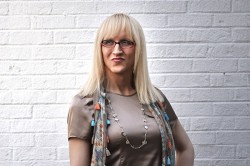Living
End of the movement?
Allies, athletes, bloggers, celebrities, musicians, lawmakers & locals discuss the future of LGBT advocacy
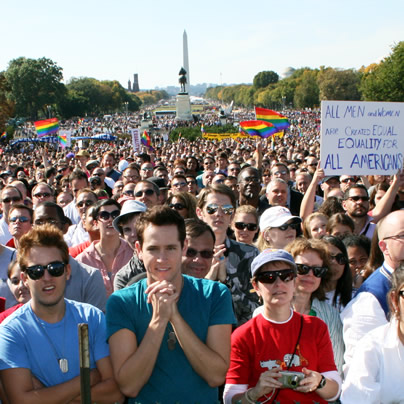
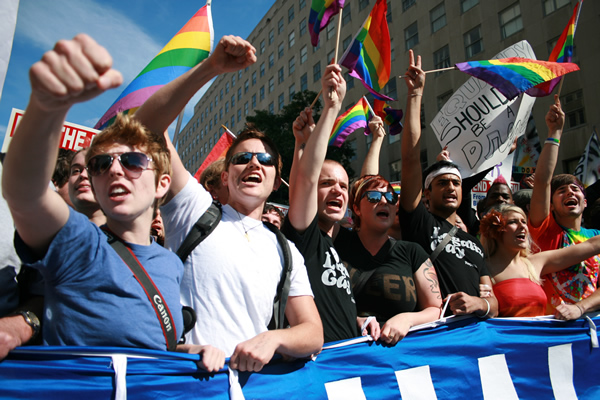
The National Equality March in Oct. 2009 (Washington Blade photo by Michael Key)
With the Supreme Court wrestling with some of our biggest issues and marriage rights expanding around the country, we asked several LGBT folks from all walks of life if the end of the movement could be near. Specifically, we asked:
“Have we reached a turning point in the LGBT rights movement and what does the end of the movement look like to you?”
Their answers will delight, surprise, provoke — and make you think.
(Compiled by Blade staff writers Michael K. Lavers, Chris Johnson, Lou Chibbaro Jr., Phil Reese and Joey DiGuglielmo)
SEE MORE ARTICLES IN THIS SERIES HERE
Heather Mizeur (Maryland State Delegate)
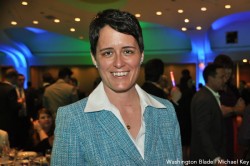
Maryland state Del. Heather Mizeur (D-Montgomery Co.) (Washington Blade file photo by Michael Key)
We have definitely reached a tipping point. With 12 states and counting, LGBT equality is on the march and there is no turning back. It was exciting for Maryland to play such a central role in being the first state below the Mason-Dixon line to pass marriage equality, and the first to affirm its support through the popular vote at the ballot box in 2012. In Takoma Park, when I ran for City Council a decade ago, my sexual orientation was not seen as anything interesting or special because the community had already grown to fully embrace all of its LGBT residents. Now, as I explore a run for governor of Maryland, I find that voters throughout the state are more impressed and interested in my ideas for the future than any concern over the fact that my wife would be their First Lady. We have come a long way.
I do not ever envision an “end of the movement” because as soon as we are done securing our own equality, we move on together as a community to address and tackle inequality every place it exists – poverty, racial bias and gender discrimination, to name a few. We will continue to work collaboratively, putting our community’s best talents forward, to affect positive social change for everyone.
Felipe Sousa-Rodriguez (GetEQUAL)

Felipe Sousa-Rodriguez (Washington Blade file photo by Michael Key)
It’s time to push for what we deserve.
Forty-four years ago, a group of drag queens and trans women of color — tired of the constant institutional violence perpetuated against our community — led the Stonewall riots. Riots turned into Pride and Pride continues to be our community’s opportunity to reflect on our progress, set forth our vision for equality and organize — because our lives depend on it.
Though we have made many gains, we are still severely unequal under United States law. We only have 15 percent of the rights of our straight counterparts. In my home state of Florida, I can be denied work, credit, housing, a marriage license and all manner of other rights essential to living the American dream. These issues become even more magnified when taking into account the multiple oppressions of race, immigration status, gender, etc. We have much ground to cover and waiting around is not an option.
Congress and the White House will continue to play politics with our lives unless we stand up now and push for what we truly deserve. Recently, Democratic leaders denied same-sex bi-national couples protections under immigration law; the president is sitting on an executive order that could protect 25 percent of the labor force in our nation against workplace discrimination. The incremental approach to equality is ineffective. We need a full federal equality bill. We owe it to those first mavericks who rose up and fought back against our oppression. It’s time for us to push our allies in Congress to stand up for our equality.
Gautam Raghavan (White House adviser)
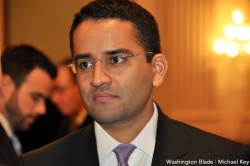
White House advisor Gautam Raghavan (Washington Blade file photo by Michael Key)
In his second inaugural address, President Obama spoke of our nation’s commitment to advancing equality for all people, a journey that “guided our forebears through Seneca Falls and Selma and Stonewall.” For the LGBT community and allies, those words were received with deep gratitude, applause and more than a few tears.
Since 2009, we have seen tremendous change unfold across the country: “Don’t Ask, Don’t Tell” repealed, hate crimes laws expanded to better protect the community, anti-bullying efforts increased, discrimination in federal housing prohibited and benefits for same-sex couples extended. As President Obama has said, this progress has not been led by lawmakers in Washington, but by ordinary citizens. It’s change driven by friends, families, colleagues and neighbors having important, heartfelt, sometimes tough conversations in neighborhoods, small towns and cities all across America.
As we reflect upon this rapid progress in the context of a decades-long movement toward equality, it can be easy to assume we’re near our journey’s end.
But if we take the president’s words to heart — “Seneca Falls, Selma, Stonewall” — we remember that movements for equality and social justice require continued commitment. Today, more than 160 years after the Seneca Falls Convention, women still don’t receive equal pay in the workplace. Nearly 50 years after Bloody Sunday, we continue to work toward full racial equality in education, housing and voting. And although the protesters at Stonewall may not have imagined marriage equality in their lifetime, their experience of violence, harassment and discrimination at work and at home still resonate in our community today.
This Pride month, we celebrate the progress we have made — through laws, policies and victories at the ballot box and in the courtroom — and we recommit ourselves to continuing our march toward a more perfect union.
I’m confident that our president will be with us every step of the way.
U.S. Rep. Mark Takano (D-Calif.)
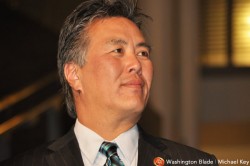
Rep. Mark Takano (D-Calif.) (Washington Blade file photo by Michael Key)
The LGBT rights movement is undoubtedly at a turning point as public opinion has moved in favor of LGBT rights and there are more LGBT federal elected officials than ever before.
But even more evident is that legislation coming out of Congress has become more reflective of true equality as laid out in the Constitution. With the Matthew Shepard Act and the repeal of “Don’t Ask, Don’t Tell,” hate-crimes protections were expanded and gay service members were allowed to serve openly in the military. Meanwhile, an increasing number of states have approved marriage equality and prohibited employment discrimination against the LGBT community through state initiatives and legislation.
For the first time in United States history, the president and a majority of United States senators support marriage equality and the Department of Justice is no longer defending the Defense of Marriage Act (DOMA) in court.
Martin Luther King Jr. once said, “The arc of the moral universe is long, but it bends toward justice.” At this moment in the LGBT rights movement, the arc is actually an acceleration curve. This is a turning point, but there is more to do before we reach the end of the arc, where full equality is recognized under the law and throughout our society.
Hassan Naveed (Gays and Lesbians Opposing Violence)
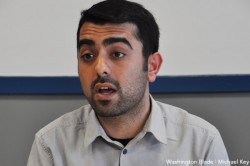
Hassan Naveed (Washington Blade file photo by Michael Key)
I think we’re at a crossroads. We’ve witnessed tremendous strides toward equality in the past few years. Public opinion on LGBT issues is progressing unquestionably in our community’s favor.
The recent political victories for marriage equality in several states represent major milestones. As we celebrate these successes and others to come, it’s important to recognize that only history will attest to the true turning points of the LGBT rights movement.
For now, advocates must stride toward equality mindful of all the issues faced by LGBT peoples. Job discrimination, unfair immigration policies, health inequities, homelessness and hate crimes are not new problems, but continue to haunt our community.
The movement’s path forward must address the needs of the most vulnerable and continually accommodate our immense diversity. We’ve reached a crossroads and the direction forward will be the true test of our morality as a people and our success as a movement. For me, the movement will end when we are truly free; to live our lives to the fullest without barriers based on gender expression and identity or sexuality.
Martin Garcia (Gertrude Stein Democratic Club)
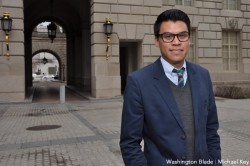
Martin Garcia (Washington Blade file photo by Michael Key)
As we watch the news and look at the national trends, it gets me very excited seeing all signs pointing to moving toward full equality. The number of successes in achieving marriage equality on the state level, the optimistic views on the upcoming Supreme Court decisions, national polls showing a rise in favor of LGBT rights show we definitely have the wind at our backs.
However, we still have a very long journey ahead of us on a number of issues affecting LGBT people and will need to continue fighting.
We need to continue the fight for HIV/AIDS research, education and funding to decrease the infection rate and raise awareness, that schools are safe for all LGBT students and staff, that we are secure being out at our jobs, that we are not discriminated against when finding housing, that we are supporting our youth to ensure they do not end up homeless or worse no longer with us, and fight to ensure that not only some of us are winning but that we are lifting everyone in our community up.
So as exciting and promising as these recent, and hopefully soon-to-be, victories are, we are not done and need to continue the fight for full equality.
Chad Griffin (president, Human Rights Campaign)
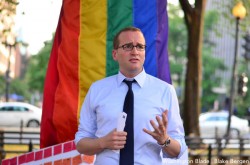
Human Rights Campaign President Chad Griffin (Washington Blade file photo by Blake Bergen)
This Pride month, the LGBT movement has so many reasons to be hopeful. From historic oral arguments at the Supreme Court, to victories for marriage equality in Delaware, Rhode Island and Minnesota, to the out-and-proud leadership of athletes like Jason Collins, Brittney Griner and Robbie Rogers, LGBT people and our families have never been so visible and so welcome in American life.
But, as a community, we can’t let progress distract us from the work left to do. We’ve got to make sure that every person in this country gets to see that progress, too.
The fact is that when transgender people still face truly shocking rates of harassment and violence, when a gay man can still be openly murdered on the streets of New York City for who he is, when LGBT youth are still roughly 10 times more likely to be homeless, our work is far from complete. We’re not even close to where we need to be.
So as we gather as a community to celebrate Pride, this movement needs a fire in its belly now more than ever. As long as any LGBT young person feels unwelcome in their community, their church or even around their own dinner table, we’ve got work to do.
Pride, after all, is a celebration with a message: equality everywhere for everyone. And that vision isn’t achieved until it reaches every single person in every corner of this vast country.
Amy Loudermilk (Mayor’s Office of GLBT Affairs)
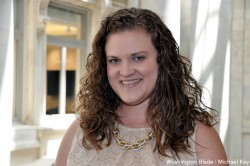
Amy Loudermilk (Washington Blade photo by Michael Key)
I think we’ve absolutely hit a turning point in the LGBT rights movement. With the recent explosion in the number of states approving marriage-equality measures, our president supporting full equality and the two Supreme Court cases set to be decided very soon, how could anyone deny the country’s mood is changing about this issue and that the momentum is very much in favor of equality? I also couldn’t be more proud that the District was one of the first jurisdictions with marriage equality.
That said, there are still lots of legal issues that need to be addressed and will take some time, with everything from retirement benefits to the availability of restraining orders to same-sex couples involved in domestic-violence situations. Ultimately, I don’t know what the end of the movement will look like because I don’t necessarily think it will end. For example, the women’s rights movement is still going on today because women still don’t make equal pay for equal work and in some states don’t have full control over their own bodies. Similarly, the civil rights movement continues today because we are still trying to fix policies that unfairly target people of color and still overcoming the lingering effects of centuries of institutionalized racism.
Prejudice in general will always exist, so I think this movement and others will continue for a very long time. And it should continue because the world’s learned a lesson about what happens when you are silent about discrimination.
Scott Wooledge (activist)

Scott Wooledge (Photo courtesy of Wooledge)
There is no end.
The work is never done, nearly 50 years after the Voting Rights Act was passed, the battle to stamp out institutionalized racism that denies people of color their votes is still front and center; in the Supreme Court, in lower courts and legislatures. And 93 years after the 19th Amendment was ratified, women still hold only 18.3 percent of the 535 seats in the 113th U.S. Congress (and zero presidents thus far).
Though we have nearly all one could hope for in here in New York, we have yet to pass transgender protections. And all LGBT communities will forever be tasked with fighting for their seats at the table and ensuring government serves the unique and specific needs of our community. In New York, we have ongoing battles to ensure our leaders don’t balance tightening state and local budgets by slashing funding for our most vulnerable (and lobbyist-free). Constituencies like indigent with HIV and homeless youth depend on our voices. Social safety net programs, like unemployment, are particularly important to a community that faces discrimination in employment and housing.
But of course I have seen the LGBT community evolve dramatically in my lifetime.
We’ve long been bound by our shared desire not to be outcasts from stalwart mainstream institutions, like the military, the Boy Scouts and marriage. And we’re winning. The question becomes, does the LGBT community have core values that bind us other than just being shunned by straight people? Fighting to expand options will result in more people exercising them. Witness the malaise of the gayborhood as LGBT people no longer feel awkward and unwelcome in more traditionally straight areas.
Ironically, there now seems to be a sense among some that actually choosing to join those institutions is an expression of betrayal to the larger community; “assimilate” and “heteronormatives” are said with derision.
I tip my hat as enthusiastically to the gender-transgressive anarchist as I do the Marine and the suburban soccer mom. I am confident this is the beautiful mosaic that makes our community, and America, beautiful.
Zack Ford (ThinkProgress.org)

Zack Ford (Photo courtesy of Ford)
The LGBT movement will not end during any of our lifetimes. In the next few decades, we may complete many of our legislative goals, such as marriage equality, nondiscrimination protections, bullying oversight and others, but the work will continue. These legal victories will shift the priorities of our movement to focus more on education, advocacy and support, but opponents of LGBT equality will no doubt continue to challenge our community’s full inclusion in society.
People of color still endure unfair treatment under “Stop and Frisk” and voter suppression laws; women still don’t have equitable salaries or access to health care; and people with disabilities still must fight for accessibility as they challenge basic prejudices. History proves that a change in the laws does not automatically end all oppression.
As LGBT people, we will always be a minority with identities that are, by nature, invisible. We will always have to come out; we will always have to help other people understand how our lives are different. But my perspective is not a pessimistic one. Our momentum is strong and the work is rewarding. For many people, advocacy — and even pride — may become a much smaller priority as it becomes easier for them to integrate, an acknowledgment of the movement’s success. But equality is not a box to be simply checked off; it must be maintained like a garden. Until being queer is as uncontroversial as being left-handed, there will always be a place for the movement in some form.
Michael Crawford (Freedom to Marry)
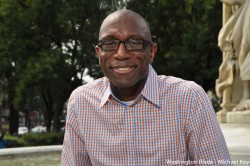
Michael Crawford (Washington Blade file photo by Michael Key)
I’m not sure that there will be an end to the LGBT movement. We tend to think about the “LGBT movement” as being about established groups and activists fighting to pass legislation and that the goals of the movement as being primarily legislative. I think we limit our possibilities for achieving true equality if we limit ourselves to thinking solely about passing legislation.
Instead, we should think about our legislative goals around issues like nondiscrimination, marriage and bullying as first steps toward transforming and reshaping the dominant culture in ways that will result in freedom for everyone.
I also think we need to take seriously the responsibility we have to help improve the lives of LGBT people across the globe. And we need to recognize that we have a lot to learn from activists in other countries who are advancing more rapidly than we are.
Just as there’s a continued need for black advocacy groups, I think there will be a continued need for activists who push us toward greater freedom. What those activists and advocacy groups will look like will change as we change the culture, but there will be a continued need for them as long as there are LGBT people.
Emily Saliers (Indigo Girls)
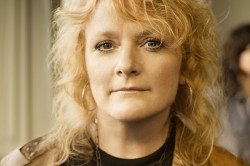
Emily Saliers (Photo courtesy of Russell Carter Artist Management)
It’s a very good and complicated question. What’s good for some of us is good for all of us. Gay marriage — even if the whole population of queer folks decided not to get married, that’s not the point — is an important right to have. And I know exactly what the other issues are. We’ve got high teen suicide rates and homelessness. You can start talking about the church and forget about it. I’ve seen the personal pain, the issues of health, gay couples lacking protection. I know all these realities. But gay marriage has become the linchpin because for society, it’s such a huge shift. The idea that gay marriage could be legislated and protected is one of those massive, massive things that is good for all of us.
The evolution of social issues is painfully slow. Just ask an African American if they’re still suffering the effects of slavery. Of course they are. You see it all the time in the stereotyping of black people in culture. My partner is Canadian, so the day after our show I’m going to be on the Hill with my partner and my baby to say, “This is what a family looks like.” If DOMA isn’t repealed, we’re moving to Canada. We’ll have no other choice. But having the right to get married is a massive sociological shift and for gay marriage to be legislated, I don’t have anything negative to say. It’s about the recognition of equal rights.
Bil Browning (Bilerico Project)

Bil Browning (Photo courtesy of Browning)
The LGBT movement will never die. Instead it will slowly amorphize as the dollars dry up and interest wanes. As we’ve already seen after the repeal of DADT, success means downsizing is inevitable.
Once basic protections for employment, public accommodations and housing have been passed and same-sex marriages are recognized at a federal level, LGBT people will become complacent. The fight for LGBT rights will move to the states as each one separately fights for marriage equality.
Groups that work on other issues will consolidate with larger organizations as funding shrinks and our community is mainstreamed. As with African-American civil rights organizations currently, a couple of groups will dominate the landscape with smaller orgs buzzing around the periphery.
I see Freedom To Marry flourishing by investing in these local battles and wouldn’t be surprised if it became deeply involved internationally. It would likely require a name change, but it could easily swallow other groups that work on family issues like Immigration Equality, Family Equality Council and PFLAG. Established and respected organizations like GLAAD, Trevor Project, Outserve/SLDN, and the Task Force all do valuable work, but in the end could comfortably be incorporated into a more broadly invested HRC, which already has more funding and name recognition.
Sadly, many of these third-tier groups are already struggling financially and will always remain in the “also ran” category because they’re not as well known. The non-profit industry at its core is a business like any other. As in the corporate world, the LGBT movement will consolidate for ease of operation, a larger customer base and maximum profits.
Carl Schmid (The AIDS Institute)
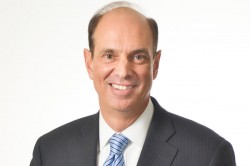
Carl Schmid (Photo courtesy of Schmid)
The LGBT rights movement has progressed slowly over several decades, spurred on by distinct events, including the AIDS crisis in the early ‘80s that led many gay men to publicly “act up” and all too often see either themselves or their friends and loved ones die. Sadly, thousands did die, though much has changed since those early days, in some ways things are still the same. Although we know how HIV can be prevented and treated, and research continues toward finding a vaccine and cure, the end is not in sight.
While people are living longer due to the advent of antiretroviral medications, gay men still shoulder two-thirds of all new HIV infections, about 33,000 new cases each year. A recent study found that one in five gay men in 21 cities have HIV, half of whom do not even know it. Unfortunately, the number of new cases is rising for those under age 25, particularly among young black gay men.
But how many of your friends talk about HIV or their own HIV? While the stigma and discrimination surrounding LGBT people has decreased, the same cannot be said for people with HIV.
It is my hope the progress that has been made in the LGBT movement can impact HIV among gay men. With a more accepting and affirming society and legalization of same-sex marriage, perhaps some factors that lead to HIV transmission will be reduced.
While much progress has been made, I do not see an end of the movement as it relates to HIV among gay men until parents and schools not only teach sexual education that encompasses homosexuality but normalizes being gay and gay relationships. Yes, great strides have been made, but so much more must occur.
Dave Kolesar (WGAY)
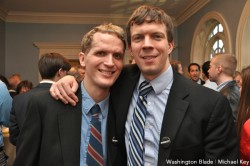
Dave Kolesar, left, and his partner, Patrick Wojahn, in Annapolis for the Maryland marriage bill signing. (Washington Blade file photo by Michael Key)
I think we have reached a turning point in the LGBT rights movement. When my partner Patrick Wojahn and I first became involved in the Maryland marriage lawsuit in 2004, many of our friends thought we were crazy. Support for same-sex marriage was polling in the 30s and Massachusetts was looking like an outlier, having just granted equal marriage rights to same-sex couples.
Almost 10 years later, marriage equality exists in about a dozen states and the victories for LGBT issues in four states at the ballot box last year showed not only that the sky didn’t fall, but that momentum has decisively swung in favor of the LGBT movement.
I don’t know what the end of the movement would look like, as I think it still has a long way to go. The marriage question may be largely settled within a decade, but there are many other important issues that need to be addressed — employment discrimination and transgender rights are probably the next big fights. And while we certainly have been successful over the past few years, recent attacks in New York City suggest that we have to be on guard against a violent counter-reaction to the success of our movement. Unfortunately it seems that in society, wherever there is a minority, there is discrimination and the hope is that one day there will be enough moral progress such that we all realize that all of us have much more in common than we do differences.
Chris Kluwe (Oakland Raiders, ally)

Chris Kluwe (Photo by Joe Bielawa)
This is a question that I don’t think has an answer anyone wants to hear.
I’ve always tried to be honest and examine the world through the lens of what is, not what I would like it to be and yes, I think we’ve reached a turning point in the LGBT rights movement in the United States, but I don’t think we’re anywhere close to the end of the movement.
The struggle for LGBT rights is the same struggle for women’s rights, the same struggle for religious rights and the same struggle for civil rights humanity has waged for the entirety of its existence, and it’s happening all over the globe — the struggle to live your own life, free of oppression, without oppressing others.
This is the battle that every generation in every nation has to fight, and will continue fighting, until the day comes when we’re all finally empathic enough to understand what effect our actions can have on other people.
Yet even though we may not see the end of that struggle in our lifetime, it is a struggle worth fighting for, because every step we take, every inch we gain in treating others with respect and dignity, is another building block our children can use to make their own progress, to build their own better world.
The end of the movement may never come, but that doesn’t mean we should stop working toward it.
Ruby Corado (transgender activist)
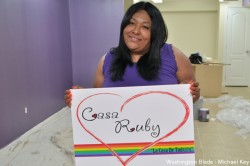
Ruby Corado (Washington Blade file photo by Michael Key)
No, we haven’t reached a turning point in the LGBT rights movement yet. We have helped others reach that point and helped changed the minds of many people.
These days we have many politicians who are legislating for us not just against us. We have a mainstream media that covers more positive stories about our lives than ever before. We have faith communities that are embracing our pursuit of dignity. We have America understanding LGBTs as human beings not just as a sexual orientation, gender identity and/or expression. But our LGBT movement has not reached a turning point among those who are LGBT. We are a movement divided by race, gender, social and economic status, ideals, geographical areas. We are a movement that does not support the young, the elder, the disadvantaged, the marginalized, the gender non-conforming and/or transgender.
I see the end of our movement looking like the rainbow that we love and embrace so much, a movement where every color (every gay, lesbian, bisexual and transgender) complements, sticks together and supports one another no matter what challenges or struggles we face through our individual storms.
At the end, we, just like the rainbow, shine together happily.
Hector Fonseca (DJ)

Hector Fonseca (Photo courtesy of Management 360)
I think there have been a number of turning points recently. The end of “Don’t Ask, Don’t Tell.” Legalization of marriage in several states and countries. An active pro athlete coming out. Those are all great moments and turning points in the LGBT community we should celebrate.
I personally think Lady Gaga should get more credit than she is getting. In my eyes, she got the ball really rolling a few years ago. Gaga made it cool again for other pop artists and celebrities like her to care about gay rights again. Kudos to her for restarting the movement.
The end of the movement to me would be a few things including openly gay pro athletes, an openly gay president and the same full equal rights that heterosexuals globally enjoy. I don’t think any of this will happen until we as a community really stick together to support LGBT causes and those who respect our community, only.
We also need to stop glorifying bullying and putting hateful people on pedestals (e.g. “She’s such a bitch, I love her.”). When we stop doing this, we will get much further much quicker. We have come a long way but there is much more work to be done.
Holly Twyford (actress)

Holly Twyford (Photo by Scott Suchman, courtesy Studio Theatre)
There’s a big difference between a tipping point and an end point. The biggest challenge the gay community has always had is we’ve never had any clear agenda other than equality. Is marriage equality the golden egg? Maybe legally so, but what does it really mean for us to reach an end point because you have to address the continued bigotry that still exists.
Of course it’s incredibly important that marriage is in front of the Supreme Court but now we need Joe Schmoe American to say, “OK, I buy into that too” or “I just met two lesbians with a child and they seemed like great parents.” So I guess my answer is yes and no. Yes, it’s a huge, exciting paradigm shift, but is it the end of the movement? No.
I think marriage is being very much held up as the brass ring because it’s a clear, visible, everyday symbol of what has been denied to us. You know, we can talk about workplace discrimination, but it’s harder to see, whereas me and my partner getting up in front of a church and someone saying, “By the power vested in me … ” that’s something very visible and you can say wife, not partner. It’s like, “Oh, OK, so you’re not married?” “Well no, but we’ve been together 20 fucking years — we’ve been together longer than you and your husband.” It’s just so great not to have to explain all that. It’s a huge symbol.
Melissa Etheridge (singer)

Melissa Etheridge (Photo by James Minchin III)
I don’t think there will ever be an end of the movement.
I think the time we can kinda go, “Whew,” is when we know that we can walk in any city and beside any stranger and understand that what makes me different from them is not something that’s fearful to them. I’ve seen such fear among people of what is not understood and what we’ve done over the last 20 years is to slowly, day by day, say, “We are people. We’re your neighbors, your children, your friends, we work with you, we are part of every community. We’re everywhere in the whole world, we are a piece of every civilization and what we bring to the table only makes us better as a nation and as a world.”
To understand that diversity and not be fearful of it is really the ultimate step. Gay marriage is important because it’s actually something you can legislate. You can’t go before the Supreme Court and say, “They’ve gotta stop hating me,” you just can’t pass that kind of a law. But you can find a way to legislate certain rights. I’m not saying we should all get married. Anybody can see I personally haven’t really been very good at it so far. Yet to have the right to do so is vitally important.
When I was a teen, for instance, there wasn’t even really any sense of gay marriage as a concept. We didn’t even really have the words for it or if there was, it was all bad. And yet here it is a generation later in front of the Supreme Court. As every new generation comes along, the fear dilutes.
Mame Dennis/Carl Rizzi (Academy of Washington)

Mame Dennis (Washington Blade file photo by Michael Key)
We’ve had gay weddings in the Academy for years. They weren’t legal of course, but we had them. I guess if the Supreme Court makes them legal and everything, that’s fine, but I don’t really think it’s going to solve anything.
I have to be honest, I shudder a bit when I think of all these people who will probably rush out and get married. I do think the gay girls take it a little more seriously than the men, but I think with the guys, they trick with someone and think they’re in love and I can easily see them running off and getting married and then what, eight weeks later or something, realize, well no, I’m not really in love. I’m concerned about the after effects. I think there’s going to be a huge spate of gay divorces if this goes through and that will look really bad for the community. That might give us an even worse name. You know how some of these queens are.
I think we have to spend more time earning respect and acceptance in the workplace and in the community and society in general. That’s the most important thing we have to concentrate on.
People seem so obsessed with this marriage stuff and there are so many things out there that are more important. I’m also concerned with how it will turn out when these queens run out and jump into marriage and realize later they can’t get out of it so easily. That’s not to say everyone will get divorced, of course, but some will and we’ve been so used to just shacking up for so many years and being able to leave whenever we want. It won’t always be so easy to do that. The gay girls, at least the ones I know and have been associated with, seem to stay in their relationships forever. They seem to want to make more of a commitment.
David Lett/Lena Lett (priest/drag queen)

David Lett (Washington Blade file photo by Michael Key)
For me, marriage is not the brass ring. It certainly is a milestone and it does get us a little bit closer to overall equality, but is this the end of the movement? Unfortunately I don’t think that will ever happen. I don’t think blacks could ever foresee a day when the NAACP could go away and everything would be fine from then on. Even struggles that we think of as being from a totally different era, like the Irish fully finding their place in society, as long as there’s sickness and sadness in the world, there will be discrimination and as long as you have people bound by ignorance and bound by fear, then you will have the haves and the have nots and there has to be a group for the have nots.
I don’t think it’s realistic at all given human nature, for any of the groups to just say, “OK, we’re done — let’s pack up and go home.” The people who are there to make sure these things are fully accepted over the long haul, those people will always have a job.
I don’t really see marriage — and this is from somebody who performs them — as that big a deal. I can see it symbolically and for long-term relational issues like money and securities and inheritance and that sort of thing, but it’s not really as big as some of the other issues.
If you think about it, most professionals who are involved in weddings — clergy, dress designers, event coordinators, cake decorators, organists — you’re dealing with a lot of people who happen to be gay themselves and so to be denied that themselves is a real slap in the face. It’s the same thing as it was for black people — “Oh, it’s OK for me to work in the dining room but it’s not OK to sit in the dining room?” That shit doesn’t work anymore. We’ve progressed too far and worked for too long to get where we are.
And all this will outlast the conservative movement. They’ve basically said, “Marriage, oh my God, you can’t touch that, we’ll have a constitutional amendment,” but once you start messing with the Constitution, that’s a really big deal. That’s not just a little state picking on you, that’s the whole government saying, “No, you’re an invalid creature.” But no, you will not mess with the Constitution to say that I am less than. The movement has really been the perfect example of Newton’s Law — for every action, there is an equal and opposite reaction. They came out with this stuff and we came back full force. I don’t see that ending anytime soon.
Allyson Robinson (OutServe-SLDN)
At OutServe-SLDN, we’ve seen the future of the LGBT civil rights movement. We live in that future every day.
As the morning of September 20, 2011 dawned on American military installations around the world, gay and lesbian service members awoke to a new reality: their service in defense of this country would no longer be contingent on a willingness to lie about who they were. Ending “Don’t Ask, Don’t Tell” was an historic accomplishment, decades in the making, and with it, our two predecessor organizations — Servicemembers Legal Defense Network and OutServe — achieved the goal around which they had been rallying support for years.
But when the celebrations ended and we took stock of the new military we’d helped create, we realized our work wasn’t over. It was just getting started. Gay and lesbian troops could now be “out,” but they were anything but equal.
Passing good laws and enacting good policies is hard work. Changing culture is much harder. That’s the mission we’ve claimed for ourselves at OutServe-SLDN — building a culture of inclusion and respect for LGBT people in our military — even as we continue the fight to end the discriminatory policies that remain. And that’s the work that awaits nearly every LGBT advocacy organization in America on the other side of that new world we’re hoping to create by pulling down DOMA and enacting nondiscrimination policies. It will be the work of generations, but take it from us: if you haven’t started yet, you’re already behind the power curve.
Real Estate
2026: prices, pace, and winter weather
Lingering snow cover, sub-freezing temperatures have impacted area housing market

The D.C. metropolitan area’s housing market remains both pricey and complex. Buyers and sellers are navigating not only high costs and shifting buyer preferences, but also seasonal weather conditions that influence construction, inventory, showings, and marketing time.
Seasonality has long affected the housing market across the U.S. Activity typically peaks in spring and summer and dips in winter; however, January and February 2026 brought unusually cold spells to our area, with extended freezing conditions.
Persistent snow and ice-covered roads and sidewalks have gone for days, and in some cases weeks, before melting. While snow accumulation normally averages only a few inches this time of year, this winter saw below-normal temperatures and lingering snow cover that has significantly disrupted normal activity.
Rather than relying on neighborhood teenagers to shovel snow to make some extra money, the “snowcrete” has required ice picks, Bobcats, and snow removal professionals to clear streets and alleys, free our cars from their parking spaces, and restore availability of mass transit.
These winter conditions have had an adverse impact on the regional housing market in several ways.
- Construction slowdown: New builds and exterior improvements often pause during extended cold, resulting in delayed housing starts when we need affordable housing in the worst way.
- Listing preparation: Cleaning crews, sign installers, photographers, and stagers with trucks full of furniture may be unable to navigate roads and need to postpone service.
- Showings and open houses: Simply put, buyers are less inclined to schedule visits in hazardous conditions. Sellers must ensure walkways and parking areas are clear and de-iced and be able to vacate the property while viewings are taking place.
- Inspection and appraisal delays: Like buyers and sellers, ancillary professionals may be delayed by unfavorable weather, slowing timelines from contract to close.
- Maintenance and repairs: Properties with winter damage (e.g., ice dams or frozen pipes) may experience repair delays due to contractor availability and supply chain schedules. Snow and cold can also affect properties with older and more delicate systems adversely, leading some sellers to delay listing until better conditions arrive.
- Availability of labor: Increasingly, construction, landscaping, and domestic workers are reluctant to come into the District, not because of ice, but because of ICE.
Overall, the District has shown a notable increase in days on the market compared with past years. Homes that once sold in a week or less are now often listed for 30+ days before obtaining an offer, especially in the condominium and mid-range house segments. While part of this shift can be attributed to weather and climate, interest rates, uncertain employment, temporary furloughs, and general economic conditions play key roles.
Nonetheless, we continue to host some of the region’s most expensive residences. Historic estates, including a Georgetown mansion that sold for around $28 million, anchor the luxury segment and reflect ongoing demand for premium urban property.
But even in this high-end housing sector, marketing strategies are evolving based on seasonal realities. Price reductions on unique or niche properties, such as undersized or unconventional homes, reflect a broader market adjustment where competitive pricing can shorten selling time.
For example, a beautifully renovated, 4-story brick home with garage parking and multiple decks that overlook the Georgetown waterfront sold in early February for 90 percent of the list price after 50 days on the market.
At the other end of the spectrum, a 2-bedroom investor-special rowhouse in Anacostia only took eight days to sell for under $200,000, down 14 percent from its original list price. In addition, four D.C. homes took more than 250 days to sell, including an 8-bedroom rooming house that was on the market for 688 days and closed after a 23 percent downward price adjustment.
Some frustrated sellers are simply taking their homes off the market rather than dropping prices below their mortgage balances, although we are beginning to see the resurgence of short sales for those who must sell.
Condominiums and cooperatives offer many opportunities for buyers and investors, with 1,100 of them currently on the market in D.C. alone. List prices run the gamut from $55,000 for a studio along the Southwest Waterfront to nearly $5 million for five bedrooms, four full baths, and 4,400 square feet at the Watergate.
So, while Washington metro area prices remain high, the pace of sales now reflects both seasonal and economic realities. Homes taking longer to sell, in part caused by elements of winter, signal a shifting market where buyers can take more time to decide which home to choose and have a better negotiating posture than in recent years.
Accordingly, sellers must continue to price strategically, primp and polish their homes, and prepare for additional adverse circumstances by reviewing fluctuating market conditions with their REALTOR® of choice.
Valerie M. Blake is a licensed Associate Broker in DC, MD & VA with RLAH @properties. Call or text her at (202) 246-8602, email her at [email protected] or follow her on Facebook at TheRealst8ofAffairs.
Autos
Going for gold: Ford Bronco Sport vs. Toyota RAV4
SUV world has share of bright lights, bold entrances, cut-throat competitors

Let the games begin! Just like the Winter Olympics this month, the SUV world has its share of bright lights, bold entrances, and cut-throat competitors.
Enter the Ford Bronco Sport and Toyota RAV4, both ready to claim the podium but each with a different routine. Think hiking boots versus minimalist trainers. Dirt trails versus perfectly paved roadways.
FORD BRONCO SPORT
$34,000
MPG: 25 city/30 highway
0 to 60 mph: 8.2 seconds
Cargo space: 32.5 cu. ft.
PROS: Boxy chic. Off-road ready. Easy-clean interior.
CONS: Meh gas mileage. Firm ride. Outside noise.
The Bronco Sport doesn’t try to blend in — and that’s the point. With an upright stance, squared lines and retro-rugged styling, this compact SUV looks ready for a backcountry photoshoot before you’ve even left the driveway.
Power comes from a three-cylinder turbo engine that handles daily driving with ease. Opt for the four-cylinder turbo, and the personality shifts from relaxed to assertive. Passing power improves. Highway merges are confident rather than cautious.
The standard 4×4 system sets the tone immediately. Traction is constant. Confidence is built in. Add the G.O.A.T. drive trains (in Ford cute-speak, this means “Goes Over Any Terrain”), and the Bronco Sport adapts to mud, sand, snow and rocks like a decathlete moving between events. Higher trims add skid plates, upgraded suspension and special hardware that makes rough territory feel less intimidating.
On pavement, the Bronco Sport is stable and composed, though the firm suspension can be ass-busting over deep potholes and such. And wind noise at highway speeds is kinda annoying, a tradeoff for the boxy profile.
Inside, durability meets thoughtful design. Rubberized surfaces and easy-clean materials welcome muddy boots, sandy paws or ambitious weekend projects. The cargo area features a flip-up rear window and adjustable floor, making it a breeze to load gear. Storage cubbies and nylon straps keep equipment organized without fuss.
Safety and other tech amenities are modern and practical. Wireless smartphone integration, cameras and driver-assistance gizmos such as adaptive cruise control make daily driving and long trips easier to manage.
What truly sets this SUV apart? In a sea of aerodynamic lemmings, the Bronco Sport feels like a free spirit. Rugged. Confident. A little rebellious.
And, like alpine skier Breezy Johnson, it looks particularly good with a bit of trail dust.
TOYOTA RAV4

$34,000
MPG: 47 city/40 highway
0 to 60 mph: 7.1 seconds
Cargo space: 37.8 cu. ft.
PROS: Fuel savvy. Spacious. Tech-laden features.
CONS: Less-sporty ride. Blasé base trim. Pricey options.
If the Bronco Sport is the adventurous wanderer, the Toyota RAV4 is the precision athlete who arrives early, stretches properly and performs effortlessly. Cue figure skaters Amber Glenn or Paul Poirier and you get the picture.
Fully redesigned for 2026, this compact SUV retains a formula that has made it one of the best-selling vehicles in America, blending efficiency, versatility and lots of tech features.
Toyota nixed the traditional gas engine for the RAV4, but that’s just fine. All models are now either standard hybrids, with fuel economy in the mid-40 mpg range, or plug-in hybrids, which can go up to 50 miles on battery power alone. The result: Vehicles that can handle daily commutes in near silence while retaining long-distance flexibility that would make an Olympic coach proud.
Acceleration is smooth and responsive, particularly in the plug-in hybrid, which is surprisingly quick. The transition between electric and gas power is seamless, though heavy throttle inputs mean the engine sometimes sounds strained. Handling is more predictable than sporty, so this was a minor deduction on the RAV4’s scorecard … at least from me.
But overall comfort is outstanding. The suspension absorbs potholes and uneven pavement with ease, and cabin noise remains impressively low at highway speeds. Long road trips feel relaxed rather than fatiguing — less triathlon grind, more victory lap.
Toyota’s Safety Sense offers adaptive cruise control, lane-keeping assist, enhanced collision avoidance and other systems that operate smoothly without seeming intrusive.
Inside, the revamped cabin is user-friendly. Materials are more refined than before, especially in mid- and upper-level trims. A large, high-resolution touchscreen supports the latest apps, voice commands and over-the-air updates. Such a layout is intuitive instead of flashy — stylish athleisure rather than couture.
Passenger space is generous, and cargo capacity remains among the most practical in this segment. The wide opening is especially helpful when tossing in luggage, sports equipment or an overly optimistic warehouse haul.
For drivers like me who are quick to judge efficiency, reliability and daily usability, the RAV4 delivered a gold-medal performance.

Valentine’s Day is often portrayed as a celebration of romantic love — flowers, chocolates, and candlelit dinners. But for many LGBTQ+ individuals and couples, Valentine’s Day can also be a moment to reflect on something deeper: the love that creates a safe, welcoming home.
For LGBTQ+ home buyers and sellers, homeownership is more than a financial milestone—it is an act of belonging, resilience, and pride. Owning a home can mean finally having a place where you can hold hands with your partner on the front porch, decorate with your authentic style, and build a life free from judgment. In this way, buying or selling a home is one of the most meaningful love stories many LGBTQ+ people will ever write.
This Valentine’s Day, whether you’re a first-time gay home buyer, a same-sex couple upgrading your space, or an LGBTQ+ seller moving on to your next chapter, it’s worth thinking about how love, identity, and real estate intersect—and how to navigate that journey with confidence, protection, and the right support.
Love, Identity, and the Meaning of ‘Home’
For generations, LGBTQ+ people were denied equal access to housing, homeownership, and legal protections. Even today, many LGBTQ+ home buyers still face subtle bias, uncomfortable interactions, or outright discrimination in the real estate process.
That’s why finding LGBTQ+ friendly real estate and an affirming gay friendly realtor or lesbian realtor matters so much. A home isn’t just a building—it’s a personal sanctuary. Working with LGBTQ+ real estate agents who understand your lived experience can make all the difference between a stressful transaction and a joyful one.
For over 30 years, GayRealEstate.com has been the leading gay real estate network, connecting LGBTQ+ home buyers and sellers with gay real estate agents, lesbian real estate agents, and LGBTQ+ friendly realtors who truly “get it.” Their mission has always been simple yet powerful: to ensure that every LGBTQ+ person has access to safe, respectful, and inclusive real estate services.
Finding Your Match: Choosing the Right LGBTQ+ Friendly Realtor
Much like dating, finding the right real estate agent is about compatibility, trust, and communication. Here are some key tips for choosing the best LGBTQ+ real estate representation:
- Look for experience with LGBTQ+ clients. Search for a gay realtor near me or lesbian realtor near me through GayRealEstate.com, where agents are vetted for cultural competency and community commitment.
- Ask about their experience with same-sex couple home buying. A strong agent should understand issues like joint ownership, legal protections, and financing considerations.
- Choose someone who listens. You should feel safe sharing your priorities—whether that includes proximity to LGBTQ+ nightlife, affirming schools, or lesbian-friendly neighborhoods.
- Prioritize respect and transparency. Your agent should advocate for you, not just push a quick sale.
The right gay friendly real estate agent isn’t just helping you buy a house—they’re helping you find a place to build your life.
Best Cities for LGBTQ+ Home Buyers
If love is your compass, location is your map. Some of the best cities for LGBTQ+ home buyers consistently offer strong community presence, legal protections, and welcoming neighborhoods:
- Wilton Manors, Florida – A hub for LGBTQ+ culture with thriving LGBTQ+ real estate opportunities
- Palm Springs, California – A long-standing LGBTQ+ retirement and second-home destination
- Provincetown, Massachusetts – Historic LGBTQ+ community with progressive housing protections
- Asheville, North Carolina – Growing market with inclusive real estate services
- Fort Lauderdale, Florida – Diverse, welcoming, and highly sought-after for LGBTQ+ home ownership
Working with GayRealEstate.com allows you to connect with local LGBTQ+ real estate experts who know these markets inside and out.
Navigating Legal Protections in LGBTQ+ Real Estate
Love is universal—but legal protections are not always consistent. Understanding your rights is essential when buying or selling a home as an LGBTQ+ person.
Key protections include:
- Fair Housing Act (FHA): Prohibits discrimination based on sex, which courts have increasingly interpreted to include sexual orientation and gender identity.
- State and local protections: Many cities and states offer additional safeguards against LGBTQ+ housing discrimination.
- Same-sex couple legal considerations: If you are married, joint ownership is typically straightforward. If not, consult an attorney about co-ownership agreements.
A knowledgeable LGBTQ+ friendly realtor from GayRealEstate.com can help guide you through these complexities and connect you with trusted legal professionals when needed.
Buying a Home as an LGBTQ+ Person: Practical Tips
If you’re embarking on your home-buying journey this Valentine’s season, here are smart, practical steps to take:
- Clarify your priorities. Do you want a vibrant LGBTQ+ neighborhood, quiet suburbs, or access to queer community spaces?
- Get pre-approved for a mortgage. This strengthens your position in competitive markets.
- Work with an LGBTQ+ real estate agent. Searching “finding a gay real estate agent” or “finding a lesbian real estate agent” through GayRealEstate.com is a great first step.
- Research inclusive communities. Some neighborhoods are more welcoming than others.
- Know your rights. If you experience bias, document it and seek legal guidance.
Buying a home is an act of self-love—and community love.
Selling a Home as an LGBTQ+ Person
Selling can be just as emotional as buying, especially if your home represents years of memories with your partner, friends, or chosen family.
When selling a home as an LGBTQ+ person, consider:
- Working with a gay friendly realtor who will market your home inclusively
- Highlighting LGBTQ+ community appeal in listings
- Being prepared for potential buyer bias (and knowing how to respond)
- Leaning on GayRealEstate.com’s LGBTQ+ real estate services for trusted guidance
Your story—and your home—deserve respect.
Real Estate for LGBTQ+ Families
More LGBTQ+ couples are raising children, fostering, or building blended families. This makes homeownership even more meaningful.
When searching for real estate for LGBTQ+ families, consider:
- LGBTQ+ affirming school districts
- Family-friendly queer communities
- Safe neighborhoods with inclusive values
- Access to LGBTQ+ resources and social networks
GayRealEstate.com specializes in helping LGBTQ+ families find homes that truly fit their lives.
Love, Pride, and Homeownership
At its core, Valentine’s Day is about connection. For LGBTQ+ people, homeownership can be one of the most profound expressions of love—love for yourself, your partner, your family, and your future.
Whether you are a first-time gay home buyer, a same-sex couple relocating, or an LGBTQ+ seller moving forward, you deserve an experience rooted in dignity, fairness, and celebration.
For over three decades, GayRealEstate.com has stood as the leading source for LGBTQ+ real estate, gay real estate, lesbian real estate, and LGBTQ+ home buying and selling representation. Their nationwide network of gay real estate agents, lesbian-friendly real estate agents, and LGBTQ+ friendly realtors ensures that your real estate journey is guided by professionals who understand your heart—and your home.
This Valentine’s Day, let your next chapter be written in a place where you can truly belong. Because when love leads the way, home is never far behind.
Scott Helms is president and owner of Gayrealestate.com.

